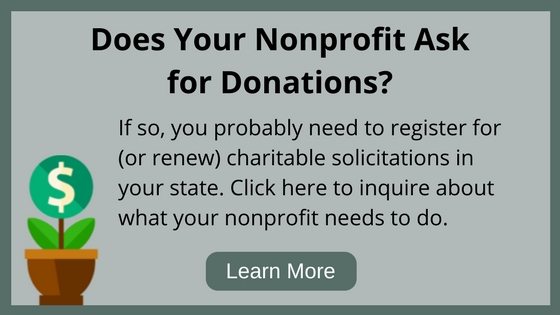The Penalties for Failing to Register for Charitable Solicitations

One of the questions we are frequently asked when it comes to charitable solicitations or fundraising registration is the cost of non-compliance. What risk does an organization run if it fails to properly register in a state where it’s required?
Public Image Risk
In reality, there are multiple risks. A big one is the risk to your nonprofit’s public image. I remember a particular case from a few years ago of a client that came to us for help after getting hit with 10 separate state violations, with penalties totaling $50,000. Worse still, they ended up as a feature story on a local TV station’s 10 o’clock news broadcast. That’s not exactly the publicity you want. We helped them get properly registered and negotiated with the state for a penalty reduction. It turned out well for them in the end, but it was a huge embarrassment and a costly distraction. Plus, the hit to their reputation wasn’t so easily fixed.
Fines and Legal Charges
State agencies that oversee fundraising activity by nonprofits take these matters very seriously. In situations like the example above, some states, including California, Pennsylvania, and Virginia publish public lists of organizations that are delinquent or are considered fraudulent. To add more pain to it, state law prevents both Pennsylvania and South Carolina from waiving penalties once assessed.
Here’s some other examples:
Ohio and Florida both have language in their state laws that assign felony charges for certain failures to comply with registration requirements.
Maryland can fine you up to $5,000 per violation. The way their law is interpreted, it could be one rule that was broken, but you get hit for $5,000 for each instance. That can accumulate pretty quickly!
Tennessee, like Maryland, can charge up to $5,000 for each violation. In addition, filing false or misleading information is a Class B misdemeanor, and a Class E felony if it happens twice.
Enjoiners From Activities
In addition to fines and charges, states can also enjoin (prohibit) your organization from conducting activities. That could range from preventing your organization from holding a planned fundraiser, to temporarily shutting down your entire operations until you get compliant.
We saw this happen to a client a few years ago. They came to us after receiving a letter from the Minnesota Attorney General’s office, effectively squashing all activities in their state until they got current with their charitable solicitations registration. The nonprofit was a Minnesota-incorporated organization, with virtually all their activities happening in their own state. The AG’s office was made aware of their issue when a member of the public saw their aggressive solicitations and checked to see if they were a registered charity. When the individual discovered they were not registered, they filed a complaint with the AG’s office, which then followed up with a total prohibition on activities.
This situation was entirely avoidable, but the leadership of the organization didn’t take registration compliance seriously. They thought the worst that could happen was getting fined a few bucks in the unlikely event they were found out. In the end, however, they lost a lot of money already invested in an upcoming fundraising event, plus saw their donation revenue plummet once the bad publicity hit. We got them current, and they were able to get back on their feet. But, it took months and cost them dearly.
Conclusion
The bigger point here is to take charitable solicitations registration seriously. It’s the law! Plus, if you are serious about operating a successful nonprofit, one that is run according to best practice, transparency, and in full compliance, it’s a no-brainer. Know what’s required of your organization, get registered where you need to be, and rest comfortably at night, knowing you are doing everything the right way.
who subscribe to our free, email newsletter. It’s information that will empower your nonprofit!
This Post Has 2 Comments
Comments are closed.


Do you know if there is fundraising registration and are there such fines in the State of CT?
Yes, the state of Connecticut does have fundraising registration requirements. The fines and fees associated with the registration vary from state to state. If you are involved with a 501(c)(3) organization, or if you are seeking 501(c)(3) status, this registration should be completed before you do any form of solicitation. Feel free to reach out to our office and speak to one of our nonprofit advisors about this filing.